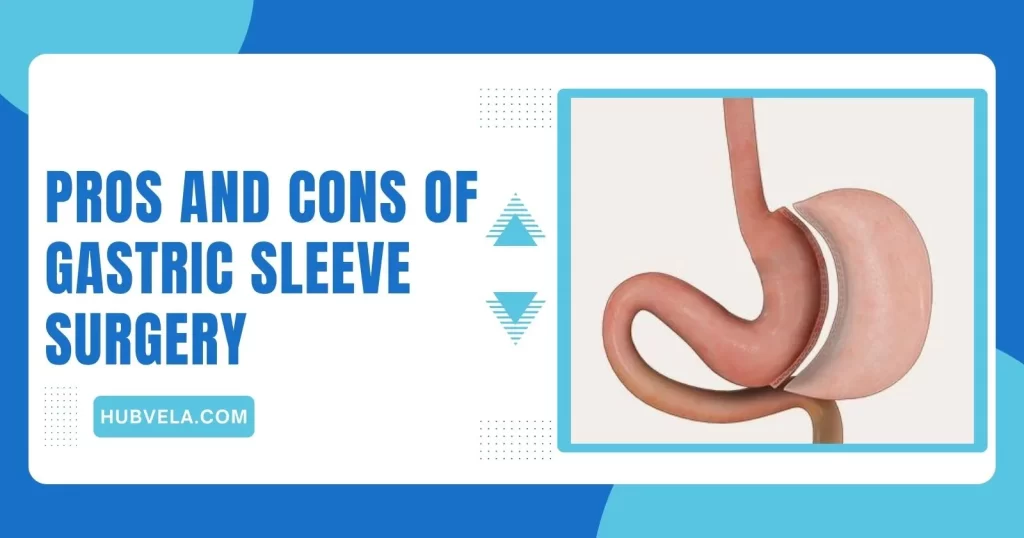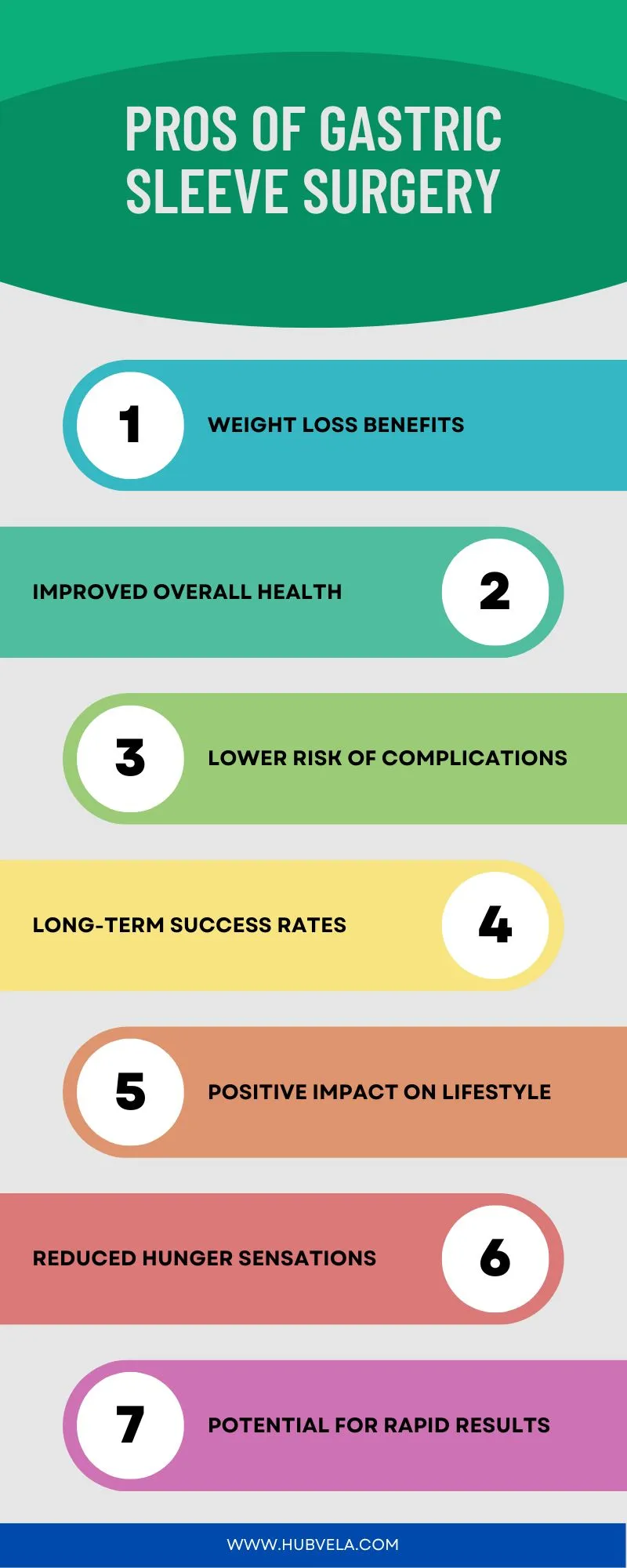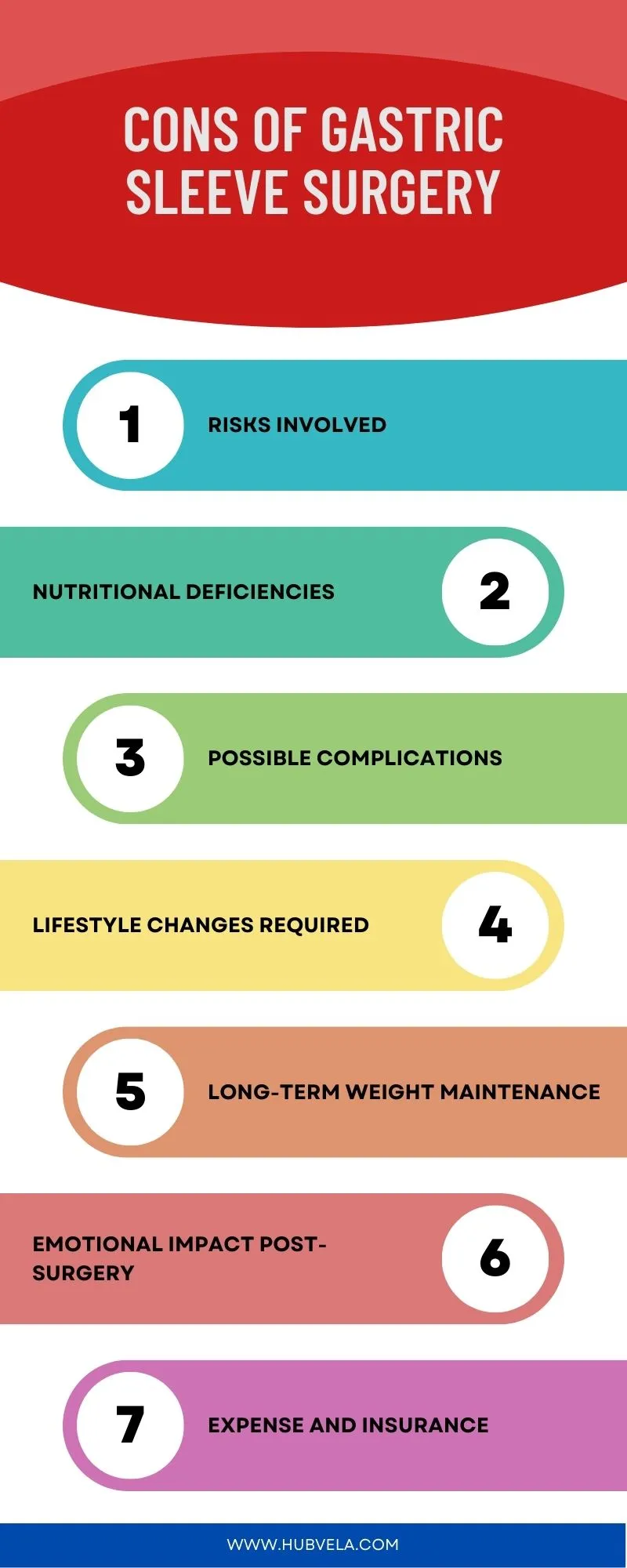Gastric sleeve surgery, also known as sleeve gastrectomy, is a popular weight loss surgery that involves removing a large portion of the stomach to reduce its size and limit the amount of food it can hold.
This procedure has gained popularity in recent years as a way to combat obesity and its related health issues. However, like any medical procedure, there are pros and cons to consider before deciding if gastric sleeve surgery is right for you.
In this article, we will explore the pros and cons of gastric sleeve surgery to help you make an informed decision about your weight loss journey.

--Advertisement--
Pros Of Gastric Sleeve Surgery
Embarking upon a transformative journey towards improved health and well-being, gastric sleeve surgery has emerged as an increasingly popular weight loss solution for individuals facing obesity-related challenges.
This innovative procedure offers numerous benefits that have positively impacted countless lives worldwide.
We will explore the pros of gastric sleeve surgery, providing readers with valuable information to help them make informed decisions about their own personal health journeys.

1. Weight Loss Benefits
One of the significant benefits of undergoing gastric sleeve surgery is the substantial weight loss potential it offers patients. This procedure can help you lose a significant amount of weight, often more than with other weight loss methods.
By reducing the size of your stomach, gastric sleeve surgery limits the amount of food you can eat, leading to fewer calories consumed and ultimately weight loss.
As you shed excess weight, you may experience improvements in various health conditions linked to obesity, such as diabetes, high blood pressure, and sleep apnea.
The weight loss achieved through gastric sleeve surgery can also boost your confidence and overall quality of life, allowing you to engage in activities that were once challenging due to excess weight.
2. Improved Overall Health
By promoting significant weight loss, gastric sleeve surgery not only enhances your physical appearance but also contributes to an overall improvement in your health.
Shedding excess weight can lead to reduced risks of various health conditions such as type 2 diabetes, high blood pressure, and heart disease.
Improved overall health post-surgery can boost your energy levels, making physical activities easier and more enjoyable.
As you continue to lose weight and adopt healthier habits, you may also experience better sleep quality and enhanced mental well-being.
The positive impact on your health extends beyond just the number on the scale, providing a solid foundation for a healthier and more fulfilling life.
3. Lower Risk of Complications
Lowering the risk of complications, gastric sleeve surgery offers a promising solution for individuals seeking long-term weight loss and improved health.
This procedure has shown a lower risk of complications compared to other bariatric surgeries. With a reduced chance of long-term issues such as vitamin deficiencies or internal hernias, gastric sleeve surgery provides a safer option for achieving weight loss goals.
The minimally invasive nature of the surgery contributes to a quicker recovery time and fewer post-operative complications.
By decreasing the potential risks associated with obesity-related health conditions, gastric sleeve surgery not only aids in weight reduction but also enhances overall well-being.
Prioritize discussing these advantages with your healthcare provider to determine if this procedure aligns with your health goals.
4. Long-Term Success Rates
Gastric sleeve surgery demonstrates impressive long-term success rates in sustaining weight loss and improving health outcomes for individuals seeking lasting results.
Studies show that patients typically lose around 60-70% of their excess body weight within the first year after surgery. Even more encouraging is that many patients maintain this weight loss over the long term.
In addition to weight loss, gastric sleeve surgery often leads to improvements in obesity-related conditions such as type 2 diabetes, high blood pressure, and sleep apnea.
Long-term success rates highlight the effectiveness of this procedure in not just helping individuals shed excess weight but also in enhancing their overall health and quality of life for years to come.
5. Positive Impact on Lifestyle
Experiencing a notable shift in dietary habits can be a major positive outcome of opting for gastric sleeve surgery. After the procedure, you’ll likely find yourself consuming smaller portions due to the reduced size of your stomach.
This change can lead to weight loss and improved overall health. As you start to shed excess weight, you may notice increased energy levels and a boost in self-confidence.
Embracing a healthier lifestyle may become more manageable, as you become more mindful of what you eat and how it affects your body.
This surgery can serve as a catalyst for positive lifestyle changes, encouraging you to make healthier food choices and adopt better eating habits for the long term.
6. Reduced Hunger Sensations
Embracing a healthier lifestyle post-gastric sleeve surgery may also involve experiencing a significant reduction in hunger sensations, which can contribute positively to your weight loss journey and overall well-being.
The surgery reduces the size of your stomach, leading to lower production of hunger-inducing hormones, making you feel full faster and for longer periods. This decreased appetite can help you make healthier food choices and control portion sizes more effectively.
7. Potential for Rapid Results
Achieving rapid weight loss is a notable advantage of undergoing gastric sleeve surgery. Following the procedure, you can expect to see significant reductions in weight within the first few months.
This quick initial weight loss can be motivating and encouraging as you progress on your journey to a healthier lifestyle.
The rapid results from gastric sleeve surgery can help improve obesity-related conditions such as type 2 diabetes, high blood pressure, and sleep apnea. Shedding excess weight quickly can boost your self-esteem and overall well-being.
It’s essential to follow post-operative guidelines and maintain a healthy diet to optimize the rapid weight loss potential of gastric sleeve surgery.
Cons Of Gastric Sleeve Surgery
While this procedure has been successful in helping many people achieve significant weight loss, it is important to consider the potential drawbacks before deciding to undergo the surgery.
We will explore the cons of gastric sleeve surgery and provide you with the information you need to make an informed decision about whether this procedure is right for you.

1. Risks Involved
Undergoing gastric sleeve surgery carries risks that should be carefully considered before proceeding with the procedure. Potential risks include infections, blood clots, and adverse reactions to anesthesia.
There’s also a risk of leaks along the staple line, which may lead to serious complications. Some patients may experience acid reflux, gallstones, or hernias post-surgery.
Nutritional deficiencies can occur due to reduced food intake and changes in nutrient absorption. In rare cases, gastric sleeve surgery can result in gastrointestinal obstructions or strictures, requiring additional procedures.
It’s important to discuss these risks with your healthcare provider and weigh them against the potential benefits of the surgery. Make an informed decision based on your individual health circumstances.
2. Nutritional Deficiencies
Consider the impact of nutritional deficiencies that may arise post-gastric sleeve surgery, affecting your health and well-being as you navigate the recovery process.
After the surgery, your stomach’s reduced size limits the amount of food you can consume, potentially leading to lower intake of essential nutrients like vitamins and minerals. This restriction can result in deficiencies, such as iron, calcium, vitamin D, and B vitamins.
To counteract this, you may need to take supplements for the rest of your life to ensure you meet your body’s nutritional requirements. Regular monitoring of your nutrient levels is crucial to prevent long-term health issues.
Be vigilant about maintaining a balanced diet and following your healthcare provider’s recommendations to mitigate the risk of developing deficiencies.
3. Possible Complications
Be aware of the potential risks and complications associated with gastric sleeve surgery before proceeding with the procedure.
While gastric sleeve surgery is generally considered safe, like any surgical procedure, it carries some risks. Possible complications include infection, blood clots, leaks along the staple line, and gastrointestinal issues like acid reflux.
Some patients may experience dumping syndrome, where food moves too quickly through the digestive system, leading to symptoms like nausea, sweating, and diarrhea.
There’s also a risk of long-term vitamin and mineral deficiencies, requiring lifelong supplementation. Complications such as strictures (narrowing of the stomach opening) and hernias may occur.
It’s important to discuss these potential risks thoroughly with your healthcare provider before deciding on gastric sleeve surgery.
4. Lifestyle Changes Required
Making significant lifestyle changes is a crucial aspect of the post-operative care regimen following gastric sleeve surgery. You’ll need to adopt a new way of eating, focusing on smaller portion sizes and nutrient-dense foods.
This means saying goodbye to high-calorie, low-nutrient options like sugary snacks and fast food. Regular exercise is also essential to support your weight loss goals and overall health.
You must commit to attending follow-up appointments with your healthcare team to monitor your progress and address any concerns.
These lifestyle changes can be challenging and require dedication, but they’re vital for long-term success after gastric sleeve surgery. Embrace the opportunity to prioritize your health and well-being through these necessary adjustments.
5. Long-Term Weight Maintenance
Maintaining weight loss over the long term can be challenging after undergoing gastric sleeve surgery. While the surgery can lead to significant weight loss initially, some individuals may struggle to sustain it over time.
Factors such as gradual stretching of the stomach pouch, poor dietary choices, lack of regular exercise, and inadequate follow-up care can contribute to weight regain.
It’s essential to stay committed to lifestyle modifications, adhere to dietary guidelines, and prioritize physical activity to prevent weight regain in the long run.
Regular monitoring by healthcare professionals and joining support groups can also be beneficial in maintaining long-term weight loss success post-gastric sleeve surgery. Remember, consistency and dedication are key to achieving lasting results.
6. Emotional Impact Post-Surgery
After undergoing gastric sleeve surgery, it’s important to acknowledge the potential emotional impact post-surgery, which can be a significant consideration for many individuals.
While the physical changes may be evident, the emotional journey post-surgery can be challenging. Some individuals may experience feelings of sadness, frustration, or even a sense of loss related to food.
Adjusting to a new way of eating and coping with the psychological aspects of weight loss can be overwhelming. Rapid weight loss can lead to changes in self-image and relationships, which may require time to adapt to.
It’s crucial to seek support from healthcare professionals, therapists, or support groups to navigate these emotional challenges effectively and ensure long-term success.
7. Expense and Insurance
Considering the financial aspect, undergoing gastric sleeve surgery can be a significant financial burden for individuals without adequate insurance coverage.
The cost of the surgery itself, pre-operative tests, post-operative care, and potential complications can add up quickly. Without insurance, the out-of-pocket expenses for gastric sleeve surgery can range from $15,000 to $25,000 or more.
Insurance coverage for bariatric procedures varies, and some policies may exclude weight loss surgeries altogether. Even with insurance, copayments, deductibles, and coverage limitations can still leave you with substantial costs.
It’s essential to carefully review your insurance policy to understand what’s covered and what you may be responsible for financially. Be prepared for potential expenses and explore all financial options before deciding to undergo a gastric sleeve surgery.
Conclusion on Pros And Cons Of Gastric Sleeve Surgery
Overall, gastric sleeve surgery can be a life-changing procedure for those struggling with obesity. The pros include significant weight loss, improved health outcomes, and increased quality of life.
However, it’s important to consider the cons such as potential complications, dietary restrictions, and the need for lifelong commitment to lifestyle changes.
Ultimately, the decision to undergo gastric sleeve surgery should be carefully weighed with the guidance of medical professionals.


